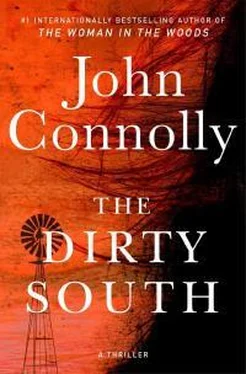‘When I was asking around – before you locked me up – I struggled to find any trace of them. Someone said they’d moved away.’
‘That’s right: a mother and two young sons. They left town not long after the funeral.’
‘Why was that?’
‘Their house burned down. As a gesture of goodwill, and in light of the loss they’d already suffered, the Cades secured alternative accommodation for them in Lucedale, Mississippi.’
‘Lucedale is a long way from Cargill.’
‘Hell of a long way. You can see the Gulf of Mexico from it, or good as.’
‘What about the fire?’
Griffin shrugged. ‘These things happen.’
‘Do they?’
‘They do around here.’
‘What about the Kernigan girl? Did she have anyone?’
‘A mother and grandmother. We’re still trying to trace the mother. She works out of town, and hasn’t been seen since Friday morning.’
‘Maybe she got offered a place in Lucedale too, and accepted it to save someone the trouble of burning down her house.’
‘I couldn’t rightly say.’
Parker was back to wishing he’d kept on driving. It seemed as though Evan Griffin was one of only a handful of people in the state of Arkansas with any interest in solving these killings, or one of the few with even a semblance of the power required to investigate them. And this was alien territory for Parker: he didn’t know the South and, truth be told, didn’t want to know it. The majority of its population didn’t think like him or share his views. How William Jefferson Clinton had emerged from them, he couldn’t say, except that Clinton was probably more like the rest than he appeared to be. A man didn’t get to be called Slick Willie by his home electorate for nothing.
‘You can’t investigate these killings without Jurel Cade’s help,’ said Parker. ‘Whatever evidence exists is held by his office.’
‘There is no evidence in the Hartley death,’ said Griffin, ‘beyond scraps.’
‘Why? Even if the coroner signed off on an accidental death, the sheriff’s office would still have been obliged to document the scene and file paperwork.’
‘It all got left in a sheriff’s office cruiser that was run through a car wash. Their vehicles have at least as many holes as ours. The contents of the boxes were destroyed, including the file, or what passed for it.’
Parker stared at him for a time, but did not speak. Words were redundant.
‘You’ll still need to talk Cade around,’ he said, finally.
‘That could be difficult.’
‘Perhaps not as difficult as you might think,’ said Parker.
‘Why do you say that?’
‘Because you now have three dead women in Burdon County, two of them murdered in recent months. Whatever the reason for the hiatus between the first and second deaths – because it makes no sense to rule out a link – the killing has now resumed with a vengeance, and it’s going to continue. Estella Jackson, the first, was a cold case, and Cade and the coroner managed to write off the second death, but Donna Lee Kernigan’s murder represents a pattern, and patterns mean publicity. It may be that Kovas Industries has so far accepted Jurel Cade’s assurances that the situation is under control, but this most recent death is going to change that. The only thing worse than a series of unsolved murders is a series of unsolved murders that’s ongoing. If Burdon County is to retain any hope of securing that investment, it lies in finding whoever is responsible for these deaths. Burying your heads in the dirt won’t work any longer.’
Griffin checked his watch.
‘I have a meeting with Cade in about an hour’s time. I think you should come along for a more formal introduction.’
‘I can hardly wait.’
‘In the meantime, there’s something I’d like to show you. It’s on the way.’
‘And what would that be?’
‘First of all, the place where Patricia Hartley’s body was found. And then,’ Griffin added, ‘the place where I think it was meant to be found.’
31
Jurel Cade prowled his father’s study, the silence broken only by the ticking of the Newport tall case clock in the corner, one of just seven known to have been signed by the eighteenth-century clockmaker Thomas Claggett. Jurel had always regarded the clock as too big for the room, and thought it more rightly belonged in the hall, but his father was not to be reasoned with on this subject or any other.
Delane Cade – or ‘Pappy’ to those who knew him best, including persons beyond his own immediate family – was now in his eightieth year, and displayed few signs of mental decline. His three children all bore his imprint, although his younger son, Nealus, had more of their dear departed mother in his temperament, which revealed itself, in Pappy’s view, as a tendency toward sensitivity that veered frequently into sullenness. His daughter Delphia, by contrast, displayed comparatively few of those traits that Pappy considered typical of, or even integral to, the female sex, either as manifested previously by her mother or by anyone else of her gender; she remained a troubling anomaly to him, like a hermaphrodite or androgyne. Yet it was to Delphia that Pappy had entrusted the day-to-day running of the family’s business concerns, though he had seen fit to ensure that all three of his offspring would receive a generous share of the Cade wealth in the event of his demise, thus avoiding any costly and unseemly wrangling over the succession.
Until recently, the promise of such a bounty might have held only marginal appeal, given that the Cades were rich in property and assets but less well endowed with hard cash. But for the past two years, Pappy, assisted by his daughter, had been intimately involved in luring Kovas to Arkansas – more particularly Burdon County, and specifically those regions of Burdon County owned and controlled by the Cade family. Only that morning, Pappy had been in conversation with three state senators regarding further modifications to the tax deal on offer to Kovas, and had scheduled a meeting with one of the governor’s fixers to ensure that 1800 Center Street would row in behind any such agreement. Pappy was still finding his feet with Mike Huckabee, who had replaced Jim Guy Tucker as governor following the latter’s conviction for conspiracy and mail fraud over Whitewater. (Which was another fuckup, one that, for a time, had threatened to derail the Kovas deal, until someone close to the Clintons gave assurances to Kovas executives that the independent counsel could look into Whitewater until his eyes bled without finding enough to indict the president. Pappy could only be grateful that he had declined to involve himself in the development of those vacation rentals on the White River. If only Slick Willie and his wife had been similarly prudent …)
And now, with Kovas on the verge of signing on the dotted line, someone was dumping dead girls almost within sight of land earmarked for the company’s construction projects. If this went on, Pappy would soon be reduced to burying the damn bodies himself, and praying that no one noticed the smell.
Pappy took in the figure of his older son. Jurel’s problem, Pappy thought, was that he held too much rage inside him. It made him unsuited to diplomacy. Pappy had hoped that the sheriff’s office might be a proving ground for Jurel, knocking some of the rough edges from him before he commenced the ascent to higher office. Instead, it appeared that his son was committed to remaining what he was, where he was: another small-time lawman in a small-time county. Pappy, however, had not lost faith in his ability to mold his middle child into a more evolved specimen. Whatever the outcome, Jurel would still be useful when Kovas moved in, because the company could be assured that the law was on its side in Burdon County, and would do everything in its power to guarantee prosperity and security for all. Unfortunately, this would be difficult for Kovas to swallow if girls kept getting themselves murdered around Cargill.
Читать дальше












